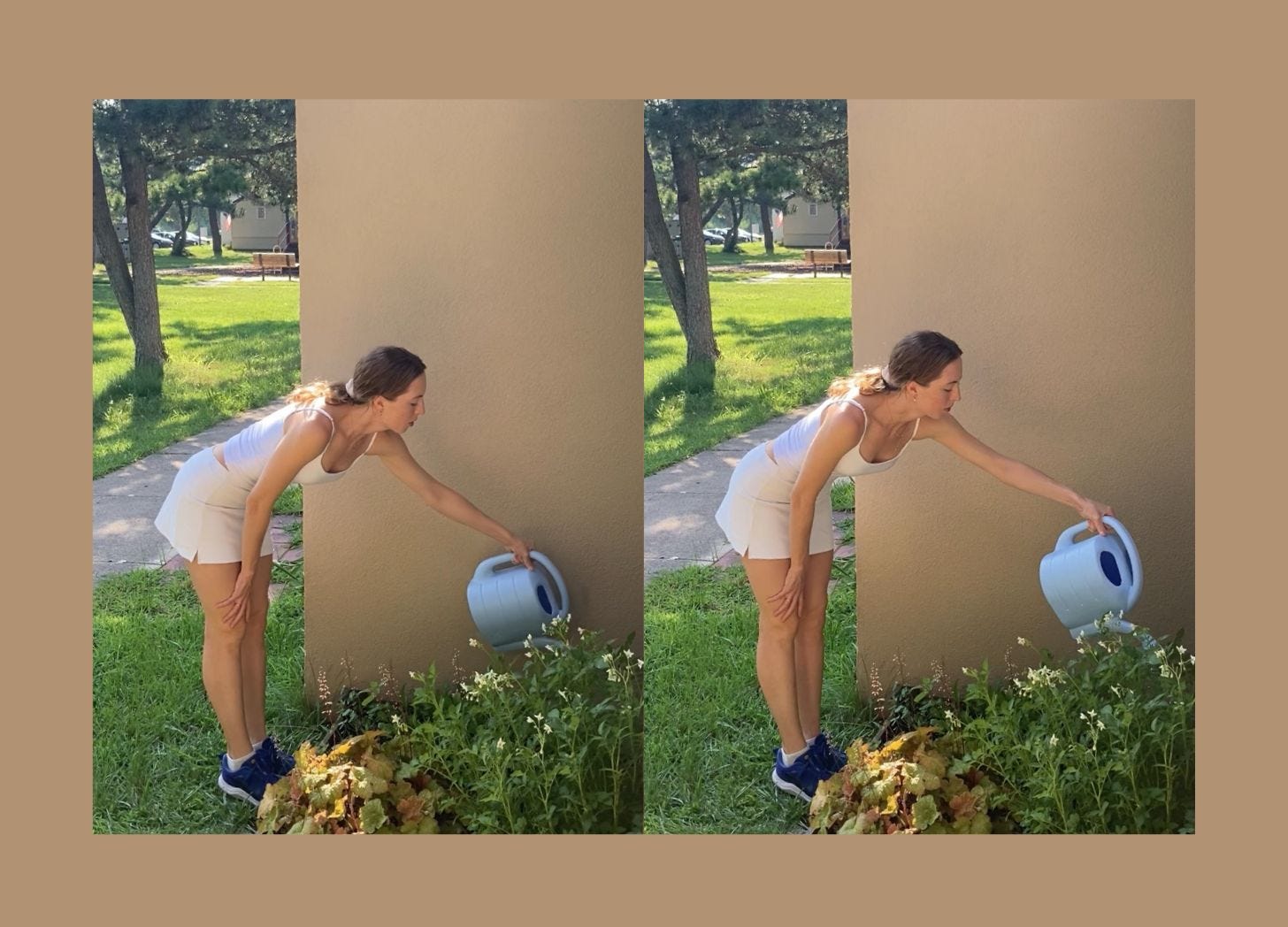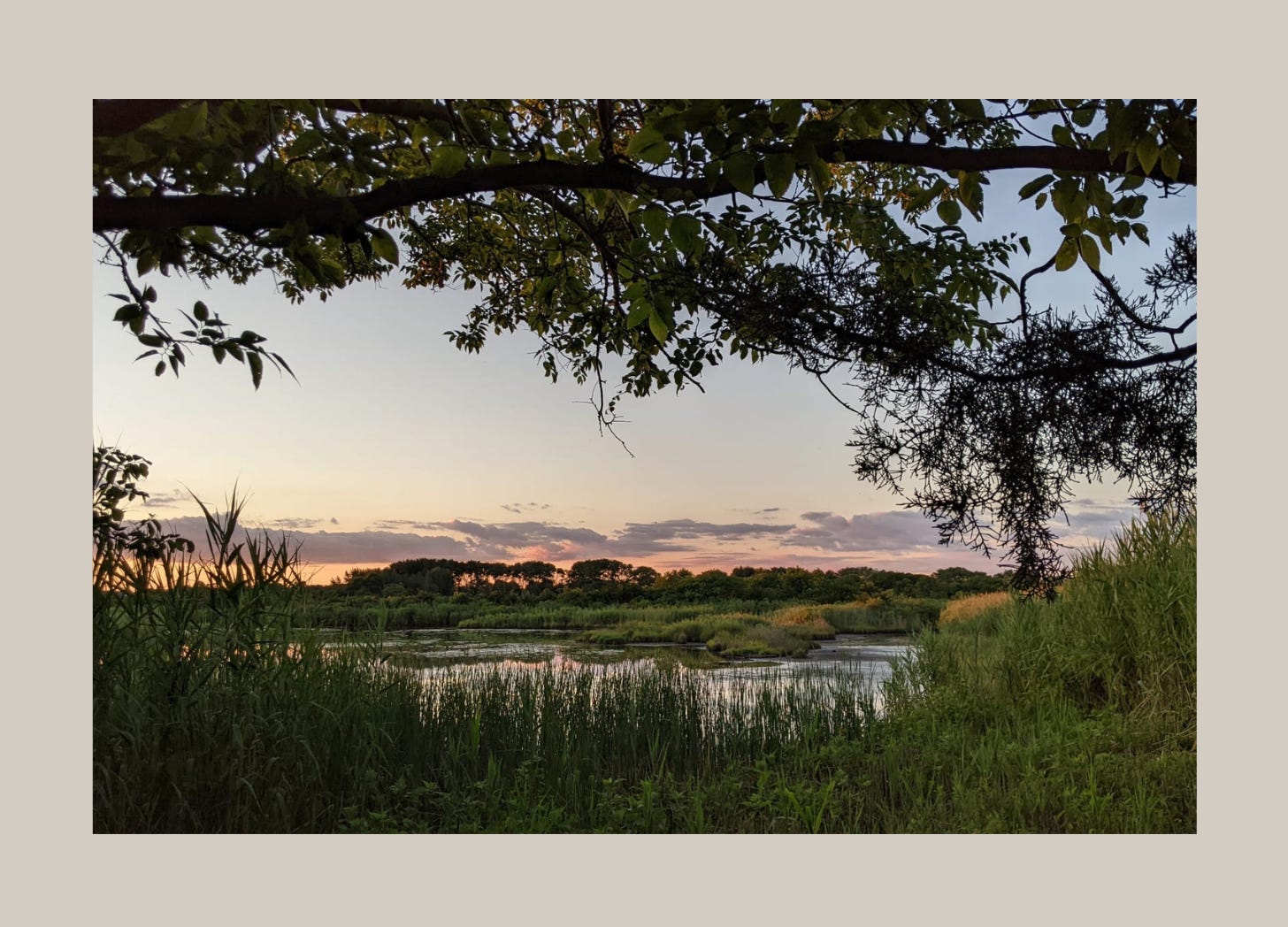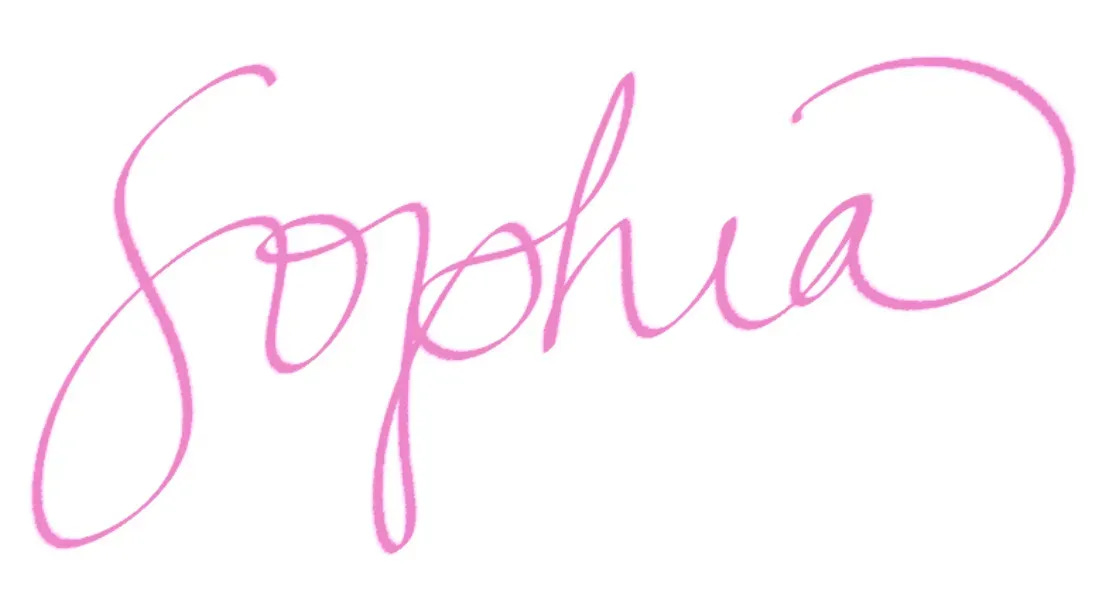"Writing a first draft is very much like watching a Polaroid develop. You can't—and, in fact, you're not supposed to—know exactly what the picture is going to look like until it has finished developing." — Anne Lamott, Bird by Bird: Some Instructions on Writing and Life
My friend, Emma, loaned me her copy of Bird by Bird and I am loving reading it bit by bit as I work on my first draft of my first novel. 🧚🏻
I am celebrating my steady progress and grateful that I reached my page count goal for July. Next, I revise and prepare for my meeting with my book editor.
August has arrived with all its golden abundance—a month of harvest, strength, and beautiful transitions. As we settle into the eighth month, I’m feeling deeply grateful for the creative fruits that have been ripening all summer long.
This week, I have been so grateful to be at home, tending to my garden, my writing, and my work.
“In the garden I tend to drop my thoughts here and there. To the flowers I whisper the secrets I keep and the hopes I breathe. I know they are there to eavesdrop for the angels.” — Dodinsky (In the Garden of Thoughts, 2013)
August contains warmth and energy for refinement as summer break ends and the school year resumes. There’s magic in this seasonal shift from the peak abundance of summer toward autumn’s more contemplative energies. It's a time for celebrating what we've cultivated while preparing for the next phase of growth.
This week, I've found myself gently reminding friends to tend to the words they choose about themselves and their experiences. For example, instead of ‘struggling with change,’ one can choose to say ‘processing, adjusting, flowing, dancing with change.’ Put a positive spin on it, babe! This is beneficial from both a mindset and wellness perspective.
As we enter this new month, I’d like to take this chance to encourage you all to be intentional gardeners of your lives, weed out harsh self-talk, and plant seeds of gentler and affirming language. Please let me know if you would like more on this topic.
In the spirit of keeping things short and sweet as I dive into revisions, I am reposting one of my favorite pieces about finding balance—something that feels especially relevant as we navigate August's transitional waters. For newer readers, this offers a glimpse into some of the metaphors and themes that weave through my writing here. For longtime readers, perhaps these three metaphors will land differently this harvest season.
FYI, you can read, or easily listen to this post in the Substack app.
Please enjoy, share, and let me know what you think. 🩵✨
And of course— Rabbit rabbit! 🐇 🐇
Re-Stack: Three metaphors for balancing elements
It’s officially back-to-school season, la rentrée, the fiery August heat still clinging to the air. Yet, I find my thoughts drifting toward water, perhaps as a way to balance out the intensity of these final summer days.
The little duckling
When I was growing up, my mom often said to me, “let it roll off your back like a duck.” She meant that I should let hurtful words, troubling circumstances, and worries slide off me, just as water rolls off a duck's back. As a child, this advice was hard to grasp and even harder to embody. The lesson was clear: don’t take things personally. But as a young person, I often interpreted this saying similarly to “sticks and stones may break my bones, but words will never hurt me.” There’s still a debate to be had about that because we know that words carry weight and meaning, and sometimes the threat of inciting action. So, I partially rejected these aphorisms, feeling that they dismissed the impact of things that, to me, were deeply affecting.
Teenage Sophie said, it’s just not that easy to not be affected by things that feel like they are affecting my emotional state and my feelings. Honestly, she still says this sometimes.
But recently I did I notice a shift in my thinking. I began to see this phrase not just as a call to toughness but as an invitation to cultivate a protective layer around myself, as the duck's oiled feathers truly are. This layer is built up and restored through self-care, self-respect, and self-love—through practices that protect one's energy.
It’s not about magically being unaffected, as I mistakenly thought I was supposed to be during my younger years. Many of us have sensitive hearts, and I didn’t want to reject or erase my sensitivity. Now, I see that I don’t have to. I can embrace my sensitivity while also adding layers of protection for myself. Like the duck in the metaphor, I can be a full entity, fully sensitive yet well-protected. The oiled feathers aren’t a superficial coat of armor; they are a fully integrated layer of protection, existing naturally within the system.
Last week, this phrase resurfaced in my mind, and I felt a renewed curiosity to explore its etymology. I wondered where my mother had picked it up. Did it come from her mother, my grandmother? Was it a regional saying, influenced by her upbringing on Lake Minnetonka, where she spent springs and summers with pet ducks?
The phrase “like water off a duck’s back” has origins in the early 19th century, likely influenced by the understanding of how ducks’ feathers repel water due to a special oil they produce. This natural oiling process keeps them dry and buoyant. The metaphor suggests not just the act of brushing off negativity but doing so with a natural, built-in mechanism—a resilience born from nurturing and care.
The phrase has been a part of the English lexicon for quite some time, with its origins likely rooted in the natural observation of ducks and other waterfowl. Ducks, as many people know, have a unique ability to repel water thanks to the oil they secrete from a gland located near the base of their tails. This oil, spread across their feathers during preening, makes them waterproof, allowing water to bead up and roll off without soaking in.
The expression itself first appeared in English literature in the early 19th century. One of the earliest recorded uses is found in the 1820s, where it was used in a metaphorical sense to describe the ability to remain unaffected by criticism or adversity, much like how a duck remains dry despite being surrounded by water. The phrase captured the imagination of the public because of its vivid and relatable imagery.
The phrase gained popularity in part because of its use by public figures and writers who employed it to describe a stoic, resilient attitude—an ideal often celebrated in Western culture. For instance, the British politician Sir Robert Peel was known to have used the phrase during parliamentary debates in the 1830s, illustrating its adoption into the lexicon of influential leaders. The phrase resonated with many because it encapsulated a desirable trait: the ability to withstand negativity without being bogged down by it.
This phrase isn’t just a piece of language but a cultural artifact, originating in regional influence, passed down through generations. Like many of these commonly used idioms, it has become more than just words—it’s a reflection of the values and experiences of the people who use it.
The well
Now, I think of this integrated layer of protection as a balance of the elements within me. My body is earth and water; it holds air and electricity (fire). Earlier this summer, I had a similar metaphoric breakthrough in how I grieve. For the past year, I pictured my sadness and grief as a deep well—bottomless, sometimes overwhelming. I decided to plant a seed of hope in this well of pain, imagining that a tree of abundance could grow from these deep waters. This imagery became a part of my daily affirmations during meditation.
But after a particularly stark turning point this summer, I realized that the seed of hope, though present, needed more to flourish. I needed to diligently add soil.
So, what is the soil for me? What is the earth to ground me? What is this oily layer of protection on my feathers?
This is what I think it looks like:
Inner knowing of oneself: A deep-seated confidence in one’s intentions and values, even when misunderstood by others. 🤍
Built and maintained self-esteem: For me, self-esteem is supported by habits, routines, and practices. Research suggests that consistent positive habits, such as regular exercise or mindfulness practices, can significantly improve self-esteem and emotional resilience. 💛
Trust: In myself, in the earth under my feet, and in the natural balance of life. And Keeping my word: To myself and others. This is essential for maintaining trust. 🩵
Grounding practices: The act of grounding, of meditation, of practiced breathing, of tapping into the physical body, of stretching out those tense shoulders and neck muscles, releasing the lower back, circling the hips, promoting circulation throughout the body, and most importantly, unwinding, relaxing, sleeping. CALM. 💙
Integrating self and relationships: Enhancing my identity by knowing the boundary between myself and others, not being overly swayed by the emotions of others in a co-dependent manner. This means connecting with loved ones while still remaining true to oneself. 💜
My husband is also like soil to me—grounded, solid, nurturing. His down-to-earth nature reels me in when my mind is being tossed by the wind, all air, needing a tether. I am so grateful for supportive relationships. 🩵
The Sailboat
A final metaphor that resonates deeply with balancing the elements is that of a sailboat. A sailboat has large sails that are lifted by the wind, but it can choose its direction by turning towards or away from the breeze. The sailboat, sturdy and fortified by the earth—the natural wood of its hull—navigates the waters with grace and control.
For the sailboat, its journey is not just about moving forward but about mastering the interplay between wind, water, and earth. It’s about knowing when to adjust the sails, when to embrace the wind, and when to anchor down. In our lives, this might translate to knowing when to push forward with our goals, when to allow ourselves to be guided by circumstances, and when to rest and recharge.
As I reflect on these metaphors, I invite you to consider your own experience. Do you feel like a duck with oiled feathers, naturally shedding the weight of negativity and hurt? Or do you feel like a sailboat, coasting along, using the winds of life to guide you in the direction you choose? Perhaps your grief feels like a deep well, a place where emotions run deep and require care and attention to cultivate growth.
These metaphors serve as powerful tools to help us understand and navigate our emotional landscapes. They remind us that protection, resilience, and balance are not static states but practices we must nurture daily. Just as a duck maintains its feathers, keeping them resilient and water-repellent, we too must find ways to keep ourselves resilient, buoyant, and balanced.
So, I ask you: What are your metaphors? How do you see yourself moving through the world? Are you maintaining your resilience, your ability to stay buoyant and flexible? What are your practices for staying well-oiled, limber, and balanced?
These practices, like the maintenance of a sailboat, the oiling of a duck’s feathers, or the cultivating of a tree - a forest! - require regular attention. They’re not one-time fixes, these are ongoing commitments to ourselves. By attending to these practices, we build up our layers of protection, ensuring that we remain resilient in the face of life’s challenges. We stay afloat, limber, and balanced, capable of navigating the ever-changing tides of life.
Ultimately, these metaphors—whether they resonate with you as they do with me or not—are invitations to explore how we can cultivate our inner strength, protection, and balance. They ask us to look inward, to understand ourselves better, and to find the tools and practices that keep us steady on our journey. 💗
Thanks for reading,
P.S. Rabbit, Rabbit, Hare, Hare, and Duck, Duck! (Extra Etymology)
The charming tradition of saying "rabbit rabbit" on the first day of each month has enchanted people across English-speaking countries for over a century, though its exact origins remain as elusive as the creatures themselves.
The earliest written reference to this superstition appears in a 1909 issue of the British journal Notes and Queries, where a parent observed: "My two daughters are in the habit of saying 'Rabbits!' on the first day of each month. The word must be spoken aloud and be the first word said in the month. It brings luck for that month."
The tradition gained notable adherents throughout the 20th century, including President Franklin Delano Roosevelt, who reportedly said "rabbits" faithfully on the first of every month and carried a rabbit's foot for good luck during his 1932 presidential campaign. Beloved comedian Gilda Radner put her own spin on it, saying "bunny, bunny" each month to attract "laughter, love, and peace."
The phrase has numerous variations across regions and families. Some say "white rabbits" (particularly popular in the UK), others repeat "rabbit" three times, and still others prefer "bunny bunny." The tradition appears especially strong in northern New England, where it may have been passed down through generations of families.
But what about "hare, hare"? Some people believe you must also say "hare" or "hare hare" before falling asleep at the end of the month to complete the cycle of good fortune. This isn't just splitting hares—there's linguistic significance here. While rabbits and hares are often used interchangeably in folklore, they're actually different animals. The word "hare" is much older in English, recorded before 900 CE and developing from Old English hara, with Germanic roots related to the Danish hare, Dutch haas, and German Hase.
The word "rabbit," meanwhile, comes from the French coniz (from Latin cuniculus) and originally referred only to young coneys. "Coney" was the standard term for these animals until about the 1700s—hence New York's Coney Island, originally "Rabbit Island."
Rabbits and hares have been considered lucky across cultures for millennia, associated with fertility, renewal, and cleverness. In Celtic tradition, they were believed to communicate with spirits through their underground burrows, while Native American cultures often saw them as trickster figures representing problem-solving and adaptability.
As for "duck duck"—well, that's my own addition to this menagerie of monthly good luck charms! If we're tending the garden of our thoughts and words, why not let water roll off our backs like a duck while we're at it? After all, the rabbit rabbit tradition may be related to "the ancient belief in swearing as a means of avoiding evil"—perhaps these simple word rituals serve as protective spells, creating what we might call integrated layers of resilience, just like a duck's naturally oiled feathers.
Whether you're team rabbit, team hare, or jokingly adding duck to the mix this month, these traditions remind us that language itself can be a form of tending—nurturing hope, protection, and possibility with our words. 🐇🦆🐇🦆











